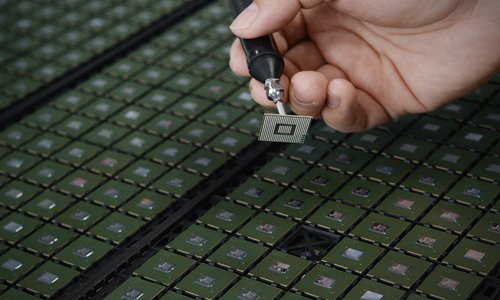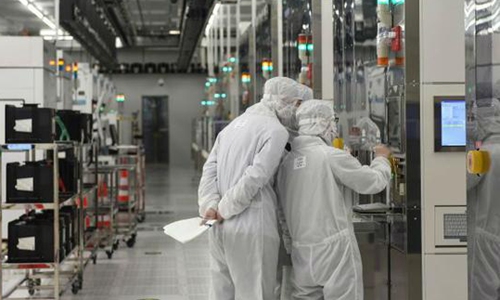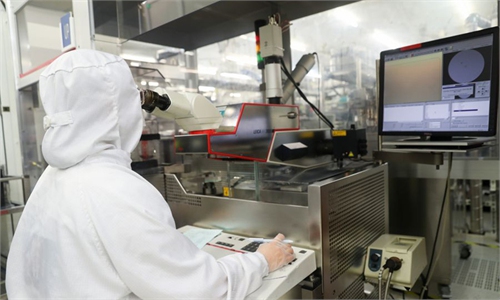SOURCE / INDUSTRIES
US restrictions on SMIC to force China to quicken self-reliance of microchips

Self-developed main control chips developed by a company based in Shanghai are showcased in April. Photo: VCG
The US' reported sanctions on the Semiconductor Manufacturing International Corp (SMIC) could not only deal a heavy blow to the Chinese chipmaker, but will also force the whole country, from the policymakers to industry players, to find out an effective way to grow a completely self-reliant industrial chain, even if it means huge losses in the short term, industry analysts said.
They noted that a ban could also be seen as the Trump administration's latest and short-sighted struggle in an effort to gain political benefit, and may end up affecting enterprises across the world along the industrial chain, and will likely draw a "collective fight-back" that will threaten its dominance in the global high-tech sector.
The US has imposed restrictions on exports to China's biggest chip maker SMIC after concluding there is an "unacceptable risk" the equipment supplied to it could be used for military purposes, Reuters said, citing a letter seen by it from the US Commerce Department dated Friday.
The Financial Times also reported that the US has imposed sanctions on SMIC, citing a letter the US Department of Commerce sent to related companies.
Following the move, companies must obtain export licenses before shipping crucial US software and equipment to SMIC, which experts say could cripple SMIC's operations.
The Pentagon earlier this month said it was working with other agencies to determine whether to blacklist SMIC for the alleged links to China's military, Reuters reported.
The Global Times had not found the document on the department's official website as of press time on Sunday.
In a statement sent to the Global Times on Saturday, SMIC said that it has not received any official notification about the US sanctions, reiterating that SMIC only provides products and services for civilian and commercial end-users. "SMIC has no relationship with the Chinese military and does not manufacture for any military users," the statement said.
"It's highly likely that the Trump administration is mulling the ban, as it's their last chance to play the card ahead of the US presidential election," Xiang Ligang, a veteran industry analyst, told the Global Times on Sunday.
The Trump administration is applying pressure in a desperate attempt to score political points ahead of the US Presidential election in November as the administration has found that the crackdown on Chinese firms including Huawei, WeChat and TikTok has not generated a "big windfall," Ma Jihua, an industry analyst, told the Global Times.
If SMIC is restricted as reported, most of its business will freeze as the company cooperates with US partners across all of its industrial chain. For example, SMIC buys chips for terminals from Qualcomm, according to Ma.
Unlike Huawei, which has stockpiled chips ahead of the September 15 ban, the Chinese chipmaker has not prepared for the situation. The impact on its business could be broad, analysts warned, noting that the move clearly demonstrates that strangling China's high-tech sector will be a long-term strategy of the US government.
"The US chip ban on Huawei has already acted as a 'wake-up' call to China's high-tech sector, and the move on SMIC will only accelerate the company's efforts to become self-reliant," Jiang Junmu, chief writer at Chinese telecom industry news website c114.com.cn, told the Global Times on Sunday.
It now appears that China needs to have a fighting spirit to master the entire chain of research and production in the semiconductor industry in order to get rid of the US bullying, though it will require time and huge costs, analysts said.
Xiang noted that unlike the Huawei ban, restrictions on the Chinese chipmaker could have a more subtle impact - if SMIC's operations came to a halt, all its customers, which are spread cross the whole world, will also find nowhere to produce chips.
According to a South China Morning Post report, citing Bloomberg data, China was the country of origin for 13 of SMIC's 38 biggest customers, or 34 percent of the total as of August 14, making up about a fifth of the chip producer's revenue. The second-biggest group of customers are based in Taiwan, at 26 percent. The US is in third place with US-based customers making nine of the top 38, or 24 percent, while South Korea is in fourth place.
Observers warned that China's highly anticipated "unreliable entity list" will be released soon if Washington imposes sanctions on SMIC.
Ma predicted that Cisco— a major competitor of Huawei and SMIC - could be put onto the list. US tech firm Oracle could also be listed.
"The US has to be aware that the harder the US crackdown on China, the more resolution will China's high-tech sector become - history has already proved the 'China spirit,'" Xiang said.


